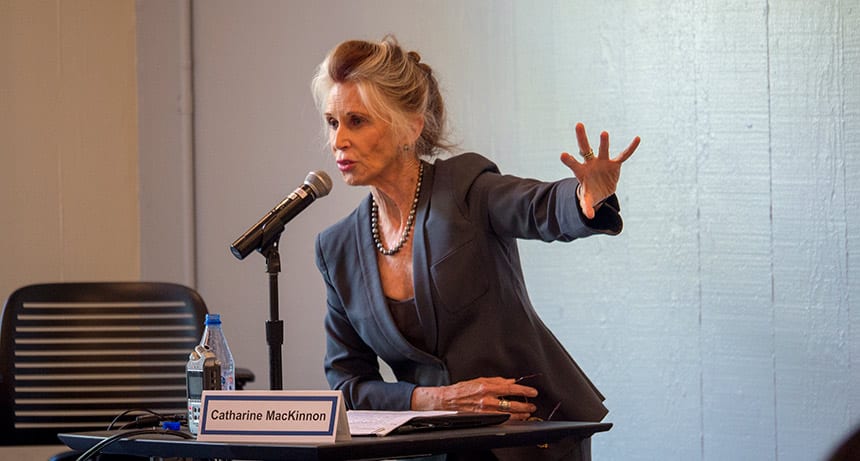
By Andrew Cohen
The #MeToo Movement has thrust sexual harassment into the spotlight. During a recent conference at Berkeley Law, managers, lawyers, scholars, and human resources professionals amplified just how far-reaching—and layered—the issue has become.
Organized by the school’s Executive Education Program, the event made clear that sexual harassment is increasingly affecting private and public employers in North America, Europe, Australia, and Asia.
Berkeley Law Professor David Oppenheimer, who helped coordinate the conference, noted the law’s failures in addressing the problem. “The social movement around #MeToo has become in some ways far more effective in calling out sexual harassment than the legal prescriptions that have produced so much disappointment,” he said.
Keynote speaker Catharine MacKinnon, a University of Michigan law professor who pioneered the legal claim for sexual harassment, is among the most-cited legal scholars in the English language. She pointed to inequality as the central dynamic of such harassment, and its disturbing frequency among powerful groups such as doctors, police, faculty, and religious leaders.
“Sexual harassment is global because the sexual abuse of power is nearly universal,” MacKinnon said, calling it a normalized “feature of masculinity” where males dominate women in society.
When reports about the actions of Hollywood producer Harvey Weinstein and other high-profile men sparked the #MeToo movement, “for the first time, we saw powerful men siding with violated women who had reported their violation,” MacKinnon said. “They realized their businesses couldn’t survive anymore if they transparently identified with these sexual abusers in the mainstream media. Instead of being a privilege of power, sexual harassment became a total disgrace.”
Around the world
Presented by the Berkeley Comparative Equality & Anti-Discrimination Law Study Group and co-sponsored by Fox Networks Group and Berkeley Law’s Miller Institute for Global Challenges and the Law, the conference opened with experts from around the world reporting on sexual harassment law in different nations.
Gender equality law advocate Lining Zhang noted that China has no national law on sexual harassment, only scattered provincial regulations with vague language, leading to “a black hole” for achieving justice.
In India, recent judicial intervention created behavioral guidelines and authorities to address complaints. However, as law professor Shreya Atrey explained, “the text of the law itself is problematic, people still think of sexual harassment as teasing, and much of the issue is seen as women being feeble.”
Professor Marie Mercat-Burns pointed out that just 18 percent of French companies have training policies, many of them multinationals. While France has moved slowly to alleviate workplace harassment, she said President Emmanuel Macron is pushing to improve cultural education, expand support for victims, and pass statutes on street and cyber harassment.
In Italy, “a huge percentage of women workers say they’ve been victims of sexual harassment,” said government special advisor Costanza Hermanin. She added that few companies have designated procedures to prevent or investigate such behavior, sexual harassment had no space in Italy’s civil jurisdiction until 2006, and there remains little public awareness of civil remedies.
What really drives U.S. company policies?

Other panelists, including Berkeley Law Professor Lauren Edelman ’86, identified problem areas in the U.S.
The winner of multiple awards for her 2016 book Workplace Discrimination: Courts, Corporations and Symbolic Civil Rights, Edelman said while most U.S. companies have mandatory training policies and complaint procedures for sexual harassment, they largely protect employers from liability rather than employees.
“Employers are far less likely to be held responsible” if they have such policies and procedures in place, she said, “irrespective of whether they are effective. … Also, courts increasingly defer to the presence of these structures without examining their quality. Their mere existence makes it very difficult to win lawsuits for harassment.”
Moreover, such procedures often miss the mark. Studies have shown that men who underwent training were less likely to report sexual harassment and more likely to engage in victim-blaming than those who did not, and that men routinely resented women for “being the reason they had to go through this training,” Edelman said.
In California, employers have been required to provide sexual harassment training to supervisors since 2007. However, the law passed “with zero scholarship or information about the effectiveness of this training,” Edelman said. “More than 10 years later, we have little sense of what California employers are doing or their level of compliance.”
Targeting areas for reform
University of Minnesota law professor Jessica Clarke noted that most U.S. jurisdictions allow between 180 and 300 days to bring a sexual harassment claim—compared to three years for property damage. She said workers must often accept mandatory arbitration, harassers are rarely prosecuted for criminal assault, and low-wage workers are particularly vulnerable—especially independent contractors and housekeepers.
“They don’t count under federal law because they’re not considered employees,” Clarke explained. “They’re also often struggling to get by and don’t have the time or resources to bring lawsuits. Plus, it’s hard to find a lawyer to take the case with (punitive damages under Title VII) capped at $300,000.”
Clarke urged states to expand sexual harassment laws to cover all contracting work, uncap damages, and lower the threshold for what harassment entails.
Other panelists stressed that shifts in corporate culture must accompany statutory improvements, calling for clear policies on prohibited behavior, an established path to consequences for that behavior, and strong internal communication.

“Responsible leadership and the tone at the top is critical,” said Rita Tuzon ’84, executive vice president and general counsel at Fox Networks Group. “This can’t just be something on a piece of paper slid across the transom. It has to involve many ways of senior management showing they don’t support inappropriate language or behavior.”
Transparency and accountability
The #MeToo movement has also increased scrutiny of investigators given that HR staff and external investigators are both paid by the employer. Attorney Tina Ro-Connolly stressed that effective investigations must include “due process, confidentiality, timeliness, impartiality, and sticking to factual rather than legal findings.”
Australian business school professor Paula McDonald urged greater objectivity. “We see a lot of reinterpretation by managers,” she lamented. “‘Oh, he’s a nice guy,’ or ‘He’s just a product of his generation.’ The focus should be on the report of the behavior, not whether the person seems like someone capable of such behavior.”
Others at the conference suggested changing the term “complainant” to “reporter,” given the negative connotation of a “complainer” in business settings. They also proposed removing “unlawful conduct” from policy language because employers are not lawyers and should simply evaluate the facts—not what constitutes illegal behavior.
“Women know the importance of being a ‘team player,’ which often at the very least involves not objecting to sexist jokes or put-downs,” Edelman said. “For many of them, it’s easier to keep incidents bottled up. They want to be seen as survivors, not victims.”
MacKinnon told the audience she has “never met a survivor of sexual harassment who didn’t want her story told. It’s only a question of under what conditions: when, how, by whom does she have control of it and does she have backup. … That really makes a difference in how she’s heard and treated.”